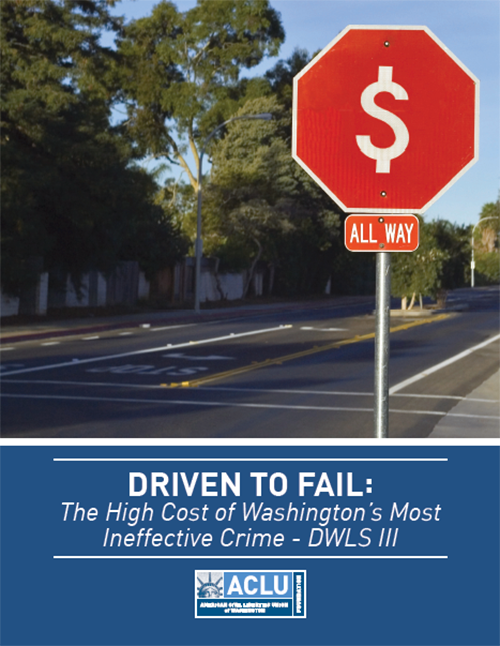
Apparently, the most commonly charged crime in Washington State – Driving While License Suspended in the Third Degree (DWLS III)- shouldn’t be a crime at all, the state chapter of the American Civil Liberties Union argues in a new report.
In “Driven to Fail: The High Cost of Washington’s Most Ineffective Crime – DWLS III” the report describes the costs of enforcing this law, explores how it burdens individuals and communities, and calls for policies that address the harm of driving with a suspended license without criminalizing it. According to the ACLU, taxpayers spend more than $40 million a year to prosecute cases of DWLS III.
“Not every social problem needs to be treated as a crime,” said Mark Cooke, the ACLU of Washington’s Campaign for Smart Justice Policy Director. “DWLS III enforcement costs taxpayers millions of dollars, yet does little to improve public safety. The crime is largely punishing people for being poor, not because they are scofflaws or dangerous drivers,” said Cooke.
Typically, a DWLS III charge comes about this way: A driver receives a ticket for a moving violation (such as speeding or rolling through a stop sign) and for various reasons does not follow through by paying the ticket or showing up in court to contest it. Hundreds of thousands of people in Washington have had their license suspended for not responding to a ticket for a moving violation. Those who continue to drive once their license is suspended may be arrested and charged with DWLS III.
The report estimates that Washington taxpayers have spent more than $1.3 billion enforcing this crime between 1994 and 2015. These costs stem from the filing of nearly 1.5 million DWLS III criminal charges, resulting in nearly 900,000 convictions. In 2015, there were nearly 40,000 DWLS III charges filed, costing taxpayers $42,199,270. The report also shows that the law is applied unequally across the state and disproportionately impacts people of color, the young, and the poor.
The report recommends that the crime of DWLS III should be taken off the books. Short of that, law enforcement, prosecutors and courts can exercise their inherent discretion and treat DWLS III as a civil offense and offer relicensing programs. Civil remedies and relicensing can be more effective and use fewer criminal justice resources. The data in the report also shows that some jurisdictions, such as the cities of Yakima and Seattle, have started to treat DWLS III as a non-criminal offense.
My opinion? It’s no mystery that DWLS III allows police to arrest people with suspended licenses. However, most don’t know that it allows police to search people’s vehicles after arrest. Therefore, any contraband, guns or other illegal items found in people’s cars can be lawfully seized.
Additionally, the defendant will face unlawful possession charges for whatever contraband found during the search. In my opinion, this is the essence of an unlawful pretextual search. And for that reason, DWLS III should be a civil infraction which circumvents the need for arrest and searches. It should not be a crime.
Please contact my office if you, a friend or family member are charged with a crime. Hiring an effective and competent defense attorney is the first and best step toward justice.






